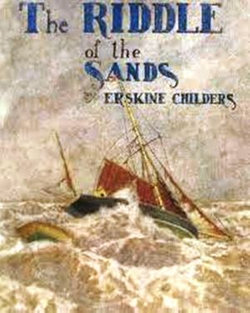Preface
A WORD about the origin and authorship of this book.
In October last (1902), my friend 'Carruthers' visited me in my
chambers, and, under a provisional pledge of secrecy, told me frankly
the whole of the adventure described in these pages. Till then I had
only known as much as the rest of his friends, namely, that he had
recently undergone experiences during a yachting cruise with a
certain Mr 'Davies' which had left a deep mark on his character and
habits.
At the end of his narrative--which, from its bearing on studies and
speculations of my own, as well as from its intrinsic interest and
racy delivery, made a very deep impression on me--he added that the
important facts discovered in the course of the cruise had, without a
moment's delay, been communicated to the proper authorities, who,
after some dignified incredulity, due in part, perhaps, to the
pitiful inadequacy of their own secret service, had, he believed,
made use of them, to avert a great national danger. I say 'he
believed', for though it was beyond question that the danger was
averted for the time, it was doubtful whether they had stirred a foot
to combat it, the secret discovered being of such a nature that mere
suspicion of it on this side was likely to destroy its efficacy.
There, however that may be, the matter rested for a while, as, for
personal reasons which will be manifest to the reader, he and Mr
'Davies' expressly wished it to rest.
But events were driving them to reconsider their decision. These
seemed to show that the information wrung with such peril and labour
from the German Government, and transmitted so promptly to our own,
had had none but the most transitory influence on our policy. Forced
to the conclusion that the national security was really being
neglected, the two friends now had a mind to make their story public;
and it was about this that 'Carruthers' wished for my advice. The
great drawback was that an Englishman, bearing an honoured name, was
disgracefully implicated, and that unless infinite delicacy were
used, innocent persons, and, especially, a young lady, would suffer
pain and indignity, if his identity were known. Indeed, troublesome
rumours, containing a grain of truth and a mass of falsehood, were
already afloat.
After weighing both sides of the question, I gave my vote
emphatically for publication. The personal drawbacks could, I
thought, with tact be neutralized; while, from the public point of
view, nothing but good could come from submitting the case to the
common sense of the country at large. Publication, there-fore, was
agreed upon, and the next point was the form it should take
'Carruthers', with the concurrence of Mr 'Davies', was for a bald
exposition of the essential facts, stripped of their warm human
envelope. I was strongly against this course, first, because it would
aggravate instead of allaying the rumours that were current;
secondly, because in such a form the narrative would not carry
conviction, and would thus defeat its own end. The persons and the
events were indissolubly connected; to evade, abridge, suppress,
would be to convey to the reader the idea of a concocted hoax.
Indeed, I took bolder ground still, urging that the story should be
made as explicit and circumstantial as possible, frankly and honestly
for the purpose of entertaining and so of attracting a wide circle of
readers. Even anonymity was undesirable. Nevertheless, certain
precautions were imperatively needed.
To cut the matter short, they asked for my assistance and received it
at once. It was arranged that I should edit the book; that
'Carruthers' should give me his diary and recount to me in fuller
detail and from his own point of view all the phases of the 'quest',
as they used to call it; that Mr 'Davies' should meet me with his
charts and maps and do the same; and that the whole story should be
written, as from the mouth of the former, with its humours and
errors, its light and its dark side, just as it happened; with the
following few limitations. The year it belongs to is disguised; the
names of persons are throughout fictitious; and, at my instance,
certain slight liberties have been taken to conceal the identity of
the English characters.
Remember, also that these persons are living now in the midst of us,
and if you find one topic touched on with a light and hesitating pen,
do not blame the Editor, who, whether they are known or not, would
rather say too little than say a word that might savour of
impertinence.
E. C.
March 1903



Share This eBook: